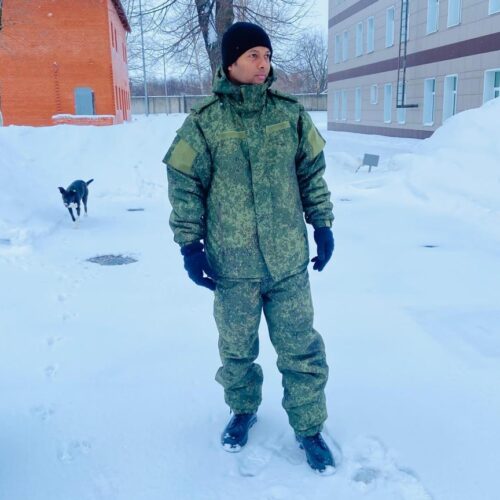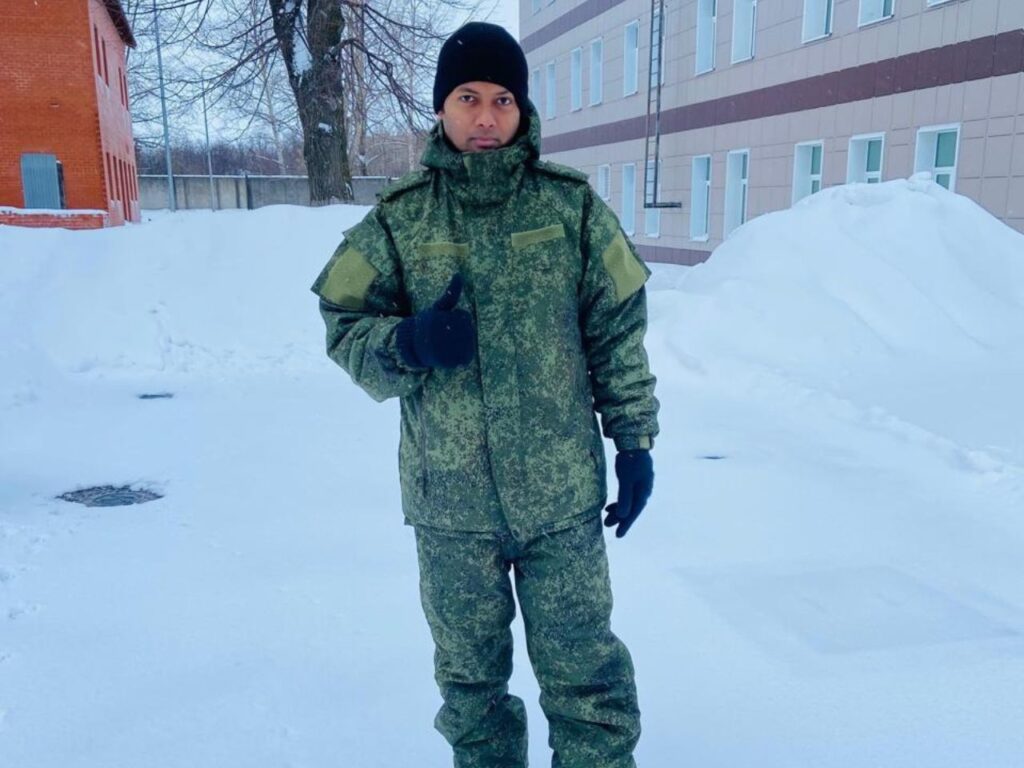Man tricked into fighting for Russia escapes and recounts the horror
Upon reaching Moscow on December 23, reality hit me hard. I found myself at Ryazan military camp, surrounded by injured boys who, like me, were deceived. We became pawns in a dangerous game. With no escape, death loomed in front of us.
- 2 years ago
May 17, 2024

KOLKATA, India — In June 2023, my contract at a five-star hotel in Kolkata ended, leaving me jobless. Despite my efforts, no other job offered a comparable salary. Anguished and uncertain, I stumbled upon Baba Vlog [which offered employment opportunities in Russia]. I found contact numbers and connected with Faisal Khan who painted an enticing picture. He promised me a job in Russia with a monthly salary of 45,000 rupees ($539 USD). He described the job as basic arms training, involving tasks like loading and unloading missiles and weapons. It seemed like a lifeline.
Seeking a better life for my family, I paid 300,000 rupees ($3,591 USD) to an agent for the job in Russia as a security helper. However, upon arriving in Moscow, they whisked me away to the Ryazan military camp, where I confronted a harrowing sight. Young men in their twenties and early thirties bore the brutal scars of war. Some were missing limbs, had fingers amputated, or were suffering other grievous injuries. Overwhelmed by the grim reality, I suddenly passed out. When I awoke, the injured boys revealed the truth. We had been lured there to die.
Read more stories from the war in Ukraine at Orato World Media
Ex-hotel worker winds up in a Russian military camp
To start the process of working in Russia, I scraped together 150,000 rupees ($1,796 USD) as an advance payment and handed it over to Faisal Khan. However, instead of a work visa, he gave me a tourist visa. I felt apprehensive, but Khan’s assurances echoed in my mind. “We have sources; you’ll be fine,” he said. “Our connections extend even into the army.”
In December 2023, I boarded a flight from Chennai to Moscow. At Chennai airport, the immigration officer questioned my purpose for traveling to Russia. Khan’s associate intervened, instructing me to claim it was a leisure trip. The officer mentioned the ongoing war, but Khan’s man confidently declared, “He is our man.” The questions ceased, and I sailed through immigration. The entire process felt smooth, and everyone remained unaware of the fraud.
At Ryazan military camp, surrounded by injured boys who, we became pawns in a dangerous game. With no escape, death loomed in front of us. I called Khan daily, seeking reassurance. His response remained consistent. “Everything is fine,” he said. Yet, the injured boys whispered a different tale; they bore wounds inflicted by bullets and missiles.
Still, on December 27, 2023, I signed a contract stating I would remain there until January 17. Once I did that, the Russian authorities confiscated our passports, leaving us trapped in that desolate place. The horrors unfolded before my eyes. Young men lost their lives on a daily basis, buried in makeshift trenches. Russia conveniently labeled them as “missing,” shielding their families from the brutal reality.
They bury men in trenches and list them as “missing”
Surrounded by suffering, my desperation to escape intensified. The camp, however, boasted formidable security, rendering any attempt to flee futile. Determined to live, I set out to win the trust of the Russian army. During my 20 days at Ryazan, I became one of their most trusted soldiers. I extended that rapport to the other staff at the military camp. At the same time, they filled our days with rigorous training. We fired guns, hurled grenades, and adapting to life in the trenches.
Amidst the war, the Russians buried bodies in trenches, leaving many Nepalese and Cuban citizens unaccounted for. Families would never know what happened to their loved ones. It seemed they would forever be classified as “missing” in official records. I soon grappled with the realization that my own country abandoned me in a foreign land.
True, I had signed a contract like many others, but its contents remained a mystery. The contract, drafted in Russian, bore my signature on the first day of our arrival. We lacked internet access to translate its terms. In addition, our misplaced trust in the agent who lured us there led to betrayal. Russia compounded the situation by confiscating our passports. Escape seemed impossible, yet I clung to a sense of certainty: I would not meet my end in that place.
He pled for his life at the Indian Embassy in Russia
I spent evenings on the internet and discovered an Instagram account revealing the plight of young men tricked into fighting in Russia. The account owner urged me to flee to the Indian Embassy for safety. I contacted the Indian Embassy over 50 times via email and made at least 500 phone calls, to no avail. The only response I received was a reminder that I signed a contract, and they could not help.
Speaking to embassy officials, they said I lacked clearance from Russian authorities and told me to return to camp. I pleaded with them, as desertion in Russia meant death. Then, one night, under the guise of going to make a purchase, I attempted to leave. I was denied, so the next morning, on January 17, 2024, I escaped. I ran out of camp and crossed the wire border. The sharp wires left scratches all over my body. Despite the pain, I took my chance at survival.
After running for an hour, I hailed a taxi and eventually reached the Indian Embassy in Moscow. My arrival brought no solace. The signed contract and my lack of a passport left me with no case. Embassy officials met me with cold rejection. Lying at their feet begging earnestly, they outright refused me. The Embassy expelled me from the premises and forbade my return.
Shadows of survival: fighting hunger and homelessness on foreign soil
War seemed a better option than perishing on the streets, and my distress escalated. I spoke to a friend from camp, and he urged me not to return. He revealed that after my departure, they endured torture, and a seven-year imprisonment awaited me. I had no shelter and little funds. The agent who lured us there had incessantly taken his cut of my earnings. He took 200,000 rupees ($2,394 USD), leaving me with only 45,000. I finally severed all communication with him.
I lingered outside the Embassy, but eventually found refuge in a hotel in Moscow that overlooked my lack of a passport. The room housed 14 undocumented individuals, evading the law. I spent my last 30,000 rupees on lodging, paying about $10 a day. Now moneyless, my phone became inoperative. Within a month, starvation took its toll. I lost eight kilos and collapsed from hunger every fourth day. Regaining consciousness only brought tears and prayers for escape.
My appearance grew unkempt and days without shaving turned into weeks. Hunger drove me to beg, but only from fellow Indians. I feared Russian authorities who would not hesitate to apprehend an illegal immigrant soliciting money and food. Unlike the more lenient streets of India, unyielding Russian police hovered everywhere. Knowing they pursued me for desertion, I remained vigilant. Occasionally, compassionate Indians offered food, but never money. I scavenged, consuming discarded leftovers in dumpsters and leftovers on plates at eateries.
From fear to freedom: Instagram contact helps me return home
After about two weeks of starvation and fear, I escaped Russia with the assistance of an individual I contacted through Instagram. Although I cannot share the details of my departure, it involved using a white passport and was far from easy. I presented video evidence to the Embassy officials, demonstrating that I had been deceived. This led to the issuance of an emergency certificate and an exit visa. On February 1, 2024, I went to Belarus and on February 24, returned to India.
The ordeal I and others faced was dire, as we were completely at the mercy of the commanders. Also, the ability of a worker to access their phone is contingent upon their relationship with the commander. Through WhatsApp calls, I was in touch with some individuals who were dispatched to the war zone as reinforcements.
The possibility of escaping the front lines was virtually non-existent, with checkpoints every 2-3 kilometers and mandatory eight-hour shifts without breaks. The constant presence of death loomed over us, and the contract explicitly stated that no holidays could be taken for six months. Following my escape, one of my friends was imprisoned for a day. Had I returned, I would have faced severe punishment, including beatings, sleeping on the floor, and being sent to the battlefield. The situation for those still in Russia remains bleak.
Despite my efforts to inform the media upon my return to India, the families of those left behind have found little assistance from the embassy. Many were unaware of the ongoing war in Russia and had simply hoped for their loved ones to earn money. Now, in desperation, they continuously contact the Indian mission in Moscow, but to no avail.
Lesson learned: some places offer nothing but death
Looking back, I think of how I found myself in a foreign land, facing the darkest days of my life. It seems a stark contrast to the Hollywood war movies and spy thrillers I used to enjoy. For me, there was no script, no director yelling “Cut!”—just the grim reality threatening my very existence. The trauma I once empathized with on-screen became my own as I struggled to survive each day, hoping for rescue from the nightmare I was trapped in.
The following year, 2024, brought a glimmer of hope. I became one of the fortunate few to escape the clutches of Russia, leaving behind the horrors of potential death and torture in a jail that haunted my dreams. The experiences of these two years—2023, which nearly broke me, and 2024, which offered salvation—have left indelible marks on my soul.
Now, as I try to piece together my life, the Central Bureau of Investigation hounds me for details. Despite sharing everything I know, the fear still lingers, and my life remains under threat. I can tell countless stories, but I am wary of revealing too much. I have learned my lesson the hard way: some places offer nothing but death.



































































































































































































































































































































































































































































